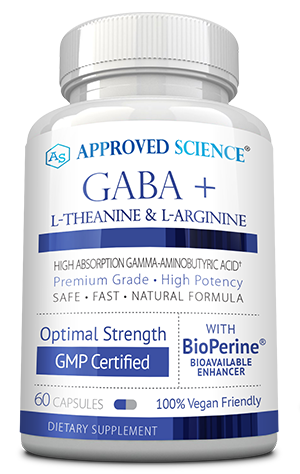Feeling stressed, anxious, or just can’t seem to relax? You’re not alone. In today’s fast-paced world, it’s easy to feel overwhelmed. But what if we told you there’s a natural way to help your brain chill out? Enter GABA, your brain’s very own “calm down” chemical. Think of it as the cozy blanket for your overactive mind. So, how can you increase GABA levels? Let’s dive in!
What Is GABA?
GABA stands for Gamma-Aminobutyric Acid. It’s a neurotransmitter, which is basically a fancy word for a chemical messenger in your brain. GABA’s main job is to slow things down when they get too hectic. GABA is made from a substance called glutamate, with the help of some enzymes and vitamin B6.
Once made, GABA can change into another substance called succinate, which is part of a big process that gives energy to our cells. GABA then goes to specific parts of nerve cells to do its job. Even though glutamate helps make GABA, they do opposite things in our nervous system. Glutamate gets the nerves all fired up, while GABA calms them down. If there’s too much glutamate or not enough GABA, it can cause problems in the body.
GABA is crucial for relaxation, stress reduction, boosting mood, and sleep. It helps you unwind, focus, and even get a good night’s sleep. Low GABA levels can lead to a range of issues, including anxiety, insomnia, and chronic stress.
Sources Of GABA
GABA can be found in a variety of natural sources. Foods like fish, almonds, citrus fruits, spinach, broccoli, and lentils, are rich in GABA. Even green tea has some! However, most Americans don’t consume enough of these foods and for that reason, GABA supplements have become more popular. Approved Science® GABA+ can help boost GABA levels in the brain to promote a higher sense of calm and relaxation.
The Approved Science® formula boasts an optimal 600 mg daily serving of GABA – which according to studies, is the ideal amount so it does not cause unwanted side effects, while still being effective. It also contains key ingredients such as Vitamin B6, L-Arginine, and L-Theanine which help promote GABA production and increase its absorption.
Lifestyle Changes To Boost GABA
Apart from supplements, there are key lifestyle changes that can also help increase GABA levels. Incorporating certain habits and practices into your daily routine can have a positive impact on your GABA levels, promoting a state of calm and relaxation. Here’s a more in-depth look:
1. Exercise
Regular physical activity isn’t just good for the heart and muscles; it also increases the production of GABA. A study published in the Journal of Physiology showed that after a session of vigorous exercise, participants demonstrated increased GABA levels (1). This could explain the calm or ‘runner’s high’ many people feel after working out.
2. Meditation and Mindfulness

These practices not only provide immediate relaxation benefits but also can induce long-term changes in neurotransmitter activity. Research indicates that individuals practicing yoga, which combines physical postures and meditation, had significantly higher GABA levels compared to those who engaged in other activities (2).
3. Healthy Diet
Consuming foods rich in GABA or that promote GABA production is crucial. Incorporate more fish, almonds, citrus fruits, spinach, broccoli, and lentils into your meals. These foods are not just nutritional powerhouses but also natural GABA boosters.
4. Avoiding Stimulants
While a morning coffee or an occasional alcoholic drink may seem harmless, overconsumption can have detrimental effects on GABA production. Both caffeine and alcohol can interfere with GABA activity. Limiting these can help maintain optimal GABA levels and ensure the neurotransmitter functions effectively.
Conclusion
Increasing your GABA levels can be a game-changer for your mental well-being. Whether it’s through natural sources, supplements, or lifestyle changes, boosting this calming neurotransmitter can help you lead a more balanced life. So why not give your brain the break it deserves?


